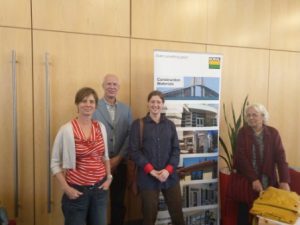30 October 2018
 It’s hard to know where to begin with Boral, one of the world’s 160 most polluting companies. You could look at the fact that it’s been shying away from renewables, despite losing $15 million USD from climate-driven weather events in the last financial period. Or that its absolute emissions are up from 2017 and that it remains reliant on coal for part of its business. Not to mention the $200 000-plus in fines that it paid for environmental non-compliance in Australia and the US.
It’s hard to know where to begin with Boral, one of the world’s 160 most polluting companies. You could look at the fact that it’s been shying away from renewables, despite losing $15 million USD from climate-driven weather events in the last financial period. Or that its absolute emissions are up from 2017 and that it remains reliant on coal for part of its business. Not to mention the $200 000-plus in fines that it paid for environmental non-compliance in Australia and the US.
Yet shareholders at the annual general meeting (AGM) today in Sydney could be forgiven for thinking the materials and construction company had turned over a green leaf, given the song and dance made by its chairman and CEO about their new climate policies.
That is, until they made it clear that Boral had zero intention of ruling out the possibility of working with mining giant Adani on its climate-busting Carmichael coal mine project.
Asked by a shareholder whether Boral still considered the controversial Adani project a potential business opportunity despite 78% of Australians who know about Adani’s mega mine opposing it, CEO Mike Kane and Chair Katherine Fagg replied that: “Our position hasn’t changed.” Watch below
As one of the globe’s top greenhouse gas emitters, Boral has an opportunity to drive a clean energy transition. So it’s unfortunate its board won’t rule out coal projects like the Adani mega mine or re-examine the parts of its business that depend on coal, like its fly ash operations in the US.
Not big on renewables
Earlier this year, Mike Kane said in an interview: ‘If someone could explain to me how you could reduce carbon emissions and expand the use of renewable energy and lower the cost of energy simultaneously, I’m game. But I haven’t heard a credible explanation of how to do that.”
A shareholder at today’s AGM highlighted recent analytics that forecast a halving of renewable energy prices over a four-year period, supported by the Australian Energy Market Operator’s view that the cheapest way to replace coal is with solar, wind and storage.
The CEO said however, that he could not commit to pursuing renewable energy sources beyond the initial steps Boral had outlined at the AGM and in its sustainability report. “It’s a dangerous world out there in Australian energy. I’m not convinced we can lower costs and increase renewables.”
As a company operating in the materials sector, Boral is viewed as at high risk from global warming’s potential impacts. In contrast to 2017 the company has acknowledged the risks caused by climate change and has started implementing recommendations made by the Task Force on Climate-related Disclosures (TCFD).
These disclosures call for Boral to test the resilience of its business against different climate scenarios. Whilst Boral has begun analysis on its cement operations (reiterating this point several times during the meeting), this still only accounts for 8% percent of its Australian business and shareholders have not yet seen these disclosures.
Boral delivered a good dose of climate spin today – it now needs to deliver a business-wide, long-term analysis of how the company will perform under different climate scenarios. Lets hope it sees fit to include 100% of the business.
Take action
Does your super fund invest in companies like Boral? Check out our super fund and fossil fuels table
